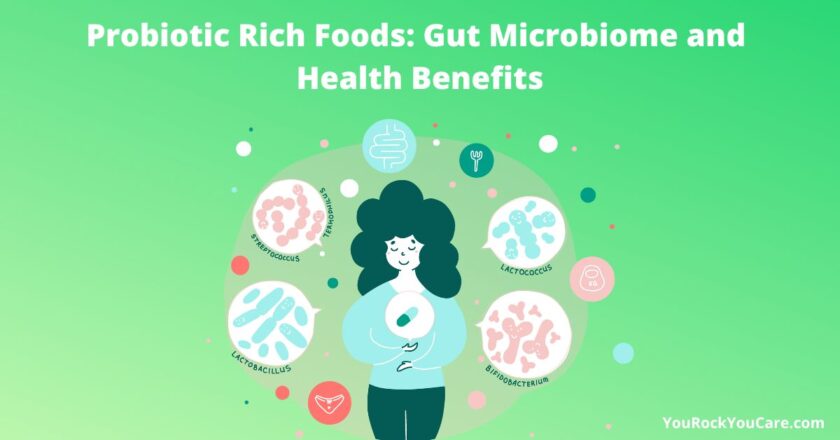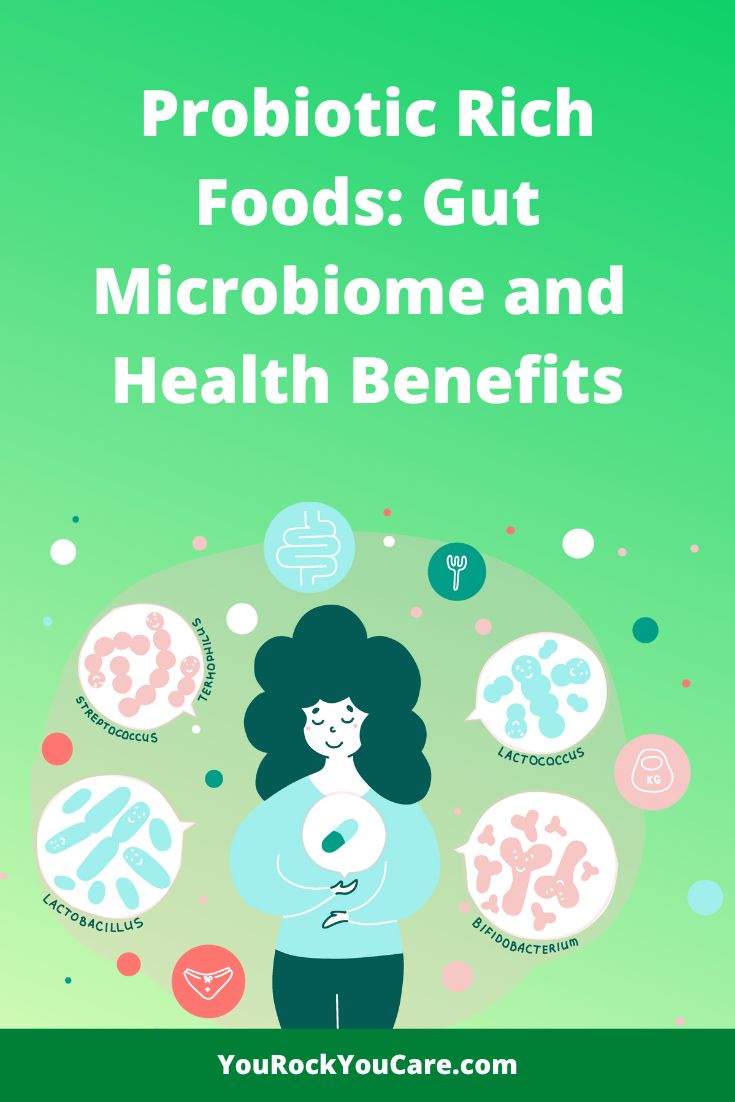Probiotic-rich foods contain live beneficial bacteria. By getting more probiotics, you can increase the good bacteria in your gut.
Improving your gut health can increase the health benefits contributed by your gut microbiome. It influences every aspect of human health.
A healthy gut can help you lose weight faster, prevent weight gain and obesity as well as lower risk for many diseases. Read on…
By increasing your intake of probiotic-rich foods, you can improve your gut microbiome. Good bacteria in your gut has many health benefits. A healthy gut can help you lose weight faster, prevent weight gain and obesity as well as lower risk for many diseases.
Why is it important to improve your gut health by increasing your intake of probiotic-rich foods?
Here are some health benefits…
The community of microbes in your gut influences every aspect of human health. It has a powerful influence on your metabolism, digestion, immune and inflammatory responses, satiety, appetite, hunger, food intake, fat storage, mood, sleep, learning and memory.
A healthy gut influences weight loss as well as well as prevention of weight gain and obesity.
An unhealthy gut is associated with several diseases, including, obesity, heart disease, type II diabetes, altered blood glucose and bowel disorders.
Here are some scientific findings:
Probiotics containing Lactobacillus and Bifidobacterium prevented overgrowth of harmful bacteria in the microbiota.
Studies showed that use of probiotics improved weight loss and other metabolic parameters.
Use of probiotics has been shown to reduce BMI, visceral fat and total body fat.
A clinical study done by Osterberg et al. (2015) showed that probiotics prevented increases in body weight and body fat in healthy males who consumed a high fat diet for 4 weeks.
Overweight and obese adults who received probiotics had significant reductions in body weight, BMI, waist circumference, fat mass percentage and insulin levels compared with adults who didn’t get probiotics.
Use of probiotics by obese individuals on high-fat diet INCREASED beneficial microbes and DECREASED harmful microbes.
Probiotics inhibited fat accumulation, reduced inflammation and insulin resistance as well as regulated neuropeptides and gastrointestinal peptides.
You Can Improve Your Gut Health By Consuming More Probiotic-Rich Foods
- Kimchi
- Miso
- Pickled vegetables
- Sauerkraut
- Kefir
- Kombucha tea
- Tempeh
- Yogurt with live active cultures
- Fermented soybean milk
If you’re interested in losing weight, some probiotics have lean bacteria… which can help you lose weight faster. Go here to get more information.
How the Food You Eat Affects Your Gut: Health Benefits of Increasing Your Intake of Probiotic-Rich Foods and Improving Your Gut Microbiome
Did you know?
Studies have shown that improving your gut health can help you lose weight FASTER and EASIER. In addition, it can help you increase your metabolism, prevent weight gain and obesity as well as lower your risk for obesity-related cancers and diseases.
Go here to learn more about science-based strategies on how to lose weight for good.
If you want to improve your gut health and lose weight faster, go here to find out more…
What’s the Difference Between Microbiota and Microbiome?
Some people use the terms microbiota and microbiome interchangeably. But, they have a crucial difference:
- Microbiota is the community of microorganisms (such as, bacteria, fungi, viruses and other microbes) throughout the body. Gut microbiota is the community of microorganisms in the intestine.
- Microbiome is the collection of genes within the microorganisms in the microbiota that can influence every aspect of human health. Gut microbiome is collection of genes within the microorganisms in the intestine.
Scientific References
MH Mohajeri, RJM Brummer, RA Rastall, RK Weersma, HJM Harmsen, M Faas, et al. “The role of the microbiome for human health: from basic science to clinical applications.” Eur J Nutr. 2018;57:1–14. doi: 10.1007/s00394-018-1703-4.
GK John and GE Mullin. “The gut microbiome and obesity.” Curr Oncol Rep. 2016;18:45. doi: 10.1007/s11912-016-0528-7. doi: 10.1007/s11912-016-0528-7.
F Okeke, BC Roland and GE Mullin. “The role of the gut microbiome in the pathogenesis and treatment of obesity.” Glob Adv Health Med. 2014;3:44–57. doi: 10.7453/gahmj.2014.018.
L Qian, R Gao, J Huang and H Qin. “Supplementation of triple viable probiotics combined with dietary intervention is associated with gut microbial improvement in humans on a high-fat diet.” Exp Ther Med. 2019;18:2262–2270. doi: 10.3892/etm.2019.7801.
ZB Wang, SS Xin, LN Ding, WY Ding, YL Hou, CQ Liu, et al. “The potential role of probiotics in controlling overweight/obesity and associated metabolic parameters in adults: a systematic review and meta-analysis.” Evid Based Complementary Altern Med. 2019b;2019:3862971. doi: 10.1155/2019/3862971. doi: 10.1155/2019/3862971.
H Koutnikova, B Genser, M Monteiro-Sepulveda, JM Faurie, S Rizkalla, J Schrezenmeir, et al. “Impact of bacterial probiotics on obesity, diabetes and non-alcoholic fatty liver disease related variables: a systematic review and meta-analysis of randomised controlled trials.” BMJ Open. 2019;9:e017995. doi: 10.1136/bmjopen-2017-017995. doi: 10.1136/bmjopen-2017-017995.
KL Osterberg, NE Boutagy, RP McMillan, JR Stevens, MI Frisard, JW Kavanaugh, et al. “Probiotic supplementation attenuates increases in body mass and fat mass during high-fat diet in healthy young adults.” 2015;23:2364–2370. doi: 10.1002/oby.21230.
K Mazloom, I Siddiqi and M Covasa. “Probiotics: how effective are they in the fight against obesity?” 2019;11:258. doi: 10.3390/nu11020258.
T Cerdó, JA García-Santos, MG Bermúdez and C Campoy. “The role of probiotics and prebiotics in the prevention and treatment of obesity.” 2019;11:635. doi: 10.3390/nu11030635. doi: 10.3390/nu11030635.
L Qian, R Gao, J Huang and H Qin. “Supplementation of triple viable probiotics combined with dietary intervention is associated with gut microbial improvement in humans on a high-fat diet.” Exp Ther Med. 2019;18:2262–2270. doi: 10.3892/etm.2019.7801.
BS Sivamaruthi, P Kesika, N Suganthy and C Chaiyasut. “A review on role of microbiome in obesity and antiobesity properties of probiotic supplements.” BioMed Res Int. 2019;2019:3291367. doi: 10.1155/2019/3291367. doi: 10.1155/2019/3291367.
A. Conlon and A. R. Bird, “The impact of diet and lifestyle on gut microbiota and human health,” Nutrients, vol. 7, no. 1, pp. 17–44, 2015.
Fava, J. A. Lovegrove, R. Gitau, K. G. Jackson, and K. M. Tuohy, “The gut microbiota and lipid metabolism: implications for human health and coronary heart disease,” Current Medicinal Chemistry, vol. 13, no. 25, pp. 3005–3021, 2006.


